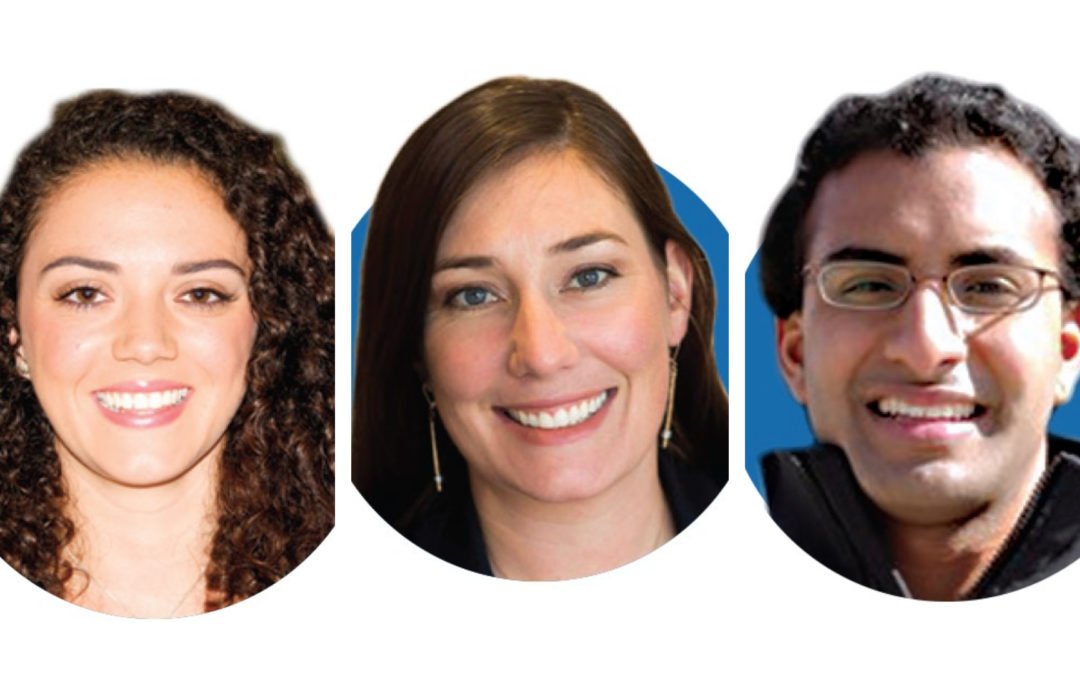
Food Entrepreneurs Find Continued Success
Whether newly hatched companies or enterprises needing a little help getting to the next level, competitors in the 2016 Food+City Challenge Prize are still going strong. We checked in with three of the Silver Prize winners to hear about their progress.
 Carolina Medina found herself in a paradoxical place after competing for the 2013 Hult Prize, a million-dollar seed-capital competition. Her team, which came together for the contest, finished in second place — but the winner took the entire purse. Undeterred, Carolina pressed forward with Agruppa, a company that leverages technology to empower mom-and-pop food vendors by providing produce at wholesale prices, eliminating middlemen. After a successful pilot in Kenya for the Hult Prize, Carolina and a partner brought Agruppa back to her home country of Colombia, and it continues to grow.
Carolina Medina found herself in a paradoxical place after competing for the 2013 Hult Prize, a million-dollar seed-capital competition. Her team, which came together for the contest, finished in second place — but the winner took the entire purse. Undeterred, Carolina pressed forward with Agruppa, a company that leverages technology to empower mom-and-pop food vendors by providing produce at wholesale prices, eliminating middlemen. After a successful pilot in Kenya for the Hult Prize, Carolina and a partner brought Agruppa back to her home country of Colombia, and it continues to grow. Carolina Medina
Agruppa
The basic issue was the cost — not the availability — of food in low-income neighborhoods. In other words, it wasn’t that the apples weren’t arriving, it’s that they were arriving at a very high cost after going through the hands of numerous middlemen, each of whom were taking their cut.
We knew we wanted to make a mobile-based solution where small shops could order directly and bypass the middlemen. Our system aggregates demand for fresh fruit and vegetables from small vendors, creating daily collective orders that add up to wholesale quantities. Vendors are economically empowered, and those living in low-income communities benefit from sustainable access to nutritious food at lower prices.
One of the biggest pivots we had here in Colombia came from the realization that Bogotá is a very large city, and distances are too long for mom-and-pop shops to come to our warehouse and pick up what they ordered the night before. We needed to become a heavy logistics company and incorporate daily deliveries to the shops—Monday through Saturday—into our model.
It was a great pivot because I realized we could be a lot more cost-efficient: It allowed us to increase the capacity of our warehouse rather than create multiple little warehouses all over the city where people would come and pick up their orders.
After bootstrapping with our current ordering channels — WhatsApp, SMS or phone calls — we’re ready to build and implement three more sophisticated channels for vendors to order their stock: a personalized app, an integrated voice recognition transactional system and a simple call center for those who are less tech-savvy and for customer service in general. This should also help cut down customer ordering time as well as optimize the logistics behind it all.
And breakeven is on the horizon! Hopefully, with 700 mom-and-pop shops — which we should have by mid- 2017 — we will become self-sustainable!
 Ashley Colpaart is a food system innovator whose business helps other food innovators. Inspired by other sharing e conomy businesses — e.g., Uber, Air BNB — The Food Corridor brings together commercial kitchens with excess capacity and nascent food businesses in need of kitchen space. It’s a win-win for all players, offering restaurants and school kitchens potential new revenue sources, and giving food producers a foot in the door to develop their products and grow their businesses. In June 2016 Ashley launched The Food Corridor’s platform in Colorado, taking on the first stage of building her market of commercial kitchens.
Ashley Colpaart is a food system innovator whose business helps other food innovators. Inspired by other sharing e conomy businesses — e.g., Uber, Air BNB — The Food Corridor brings together commercial kitchens with excess capacity and nascent food businesses in need of kitchen space. It’s a win-win for all players, offering restaurants and school kitchens potential new revenue sources, and giving food producers a foot in the door to develop their products and grow their businesses. In June 2016 Ashley launched The Food Corridor’s platform in Colorado, taking on the first stage of building her market of commercial kitchens. Ashley Colpaart
The Food Corridor
In 2015 I was reviewing applications for Community Food Project Grants to decide who would get funding. Many of the projects wanted to build infrastructure, like processing and distribution centers. But their business plans weren’t always very strong, and many lacked an asset mapping of what infrastructure already existed in their community. I was thinking, “How do you know you need to build this facility?”
During that trip, I used Air BnB and Uber for the first time, and it dawned on me that the sharing economy that exists in other sectors hasn’t been applied to the food system. Sharing is something we do with food all the time. We break bread together, people have been sharing kitchens for a long time, co-ops started in agriculture — so I thought, why not apply that same model to the food sector? I chose to do it with kitchens because that’s where a meal starts.
Our platform development process has been very customer-centric. We beta-tested our software with 12 shared-use kitchens nationally, watching them use the product and listening to them talk about their business models and what features were essential for them. Then we prioritized those features and built them. Something our Food Challenge Prize mentor said really stuck with me: “When you’re building a new product, you can build something and maybe people will want it. But if you listen closely to the problem your customer has and build a solution for it, that’s when you win.”
What’s cool about my idea is that it can be applied to any commercial kitchen asset — like refrigerated trucks, or backhauling produce, or freezer or refrigerator space. If a farmer has a bumper crop of tomatoes or there’s a hail storm coming that weekend and they want to harvest before they go to market in a few days but they don’t have a refrigerator, they could hop on The Food Corridor and find some commercial refrigerator space where they could store it for a few days. I see The Food Corridor becoming a pipeline of innovation for the food industry.
 Startup to acquisition is the ideal path for many new businesses. For Real Food Solutions, that milestone came just five months after winning a silver award at the 2016 Food+City Challenge Prize. The Boston-based company, co-founded by Neheet Trivedi, uses existing clinical research to create food-based remedies for everyday ailments, including nausea. In July 2016, they were acquired by Pink Stork Solutions, a company committed to delivering natural products to help alleviate some of the symptoms that come with pregnancy.
Startup to acquisition is the ideal path for many new businesses. For Real Food Solutions, that milestone came just five months after winning a silver award at the 2016 Food+City Challenge Prize. The Boston-based company, co-founded by Neheet Trivedi, uses existing clinical research to create food-based remedies for everyday ailments, including nausea. In July 2016, they were acquired by Pink Stork Solutions, a company committed to delivering natural products to help alleviate some of the symptoms that come with pregnancy. Neheet Trivedi
Real Food Solutions
The aha moment was seeing my sister have terrible nausea from morning sickness when she was pregnant. She was reluctant to take medication and wished for a food-based solution that would help with her nausea, be easy to eat and provide nutrition.
I knew I had to partner with somebody who has the skills and background to help build this. Through a mutual friend I met Dr. Rupa Mukherjee, a practicing gastroenterologist, who was very excited by the idea. She had a lot of patients to whom she was recommending food-based solutions, but there wasn’t a specific solution or product that she really liked. Our idea was to make products for aspects of health, starting with nausea. My role is “make it happen” — bring experts together, ask the right questions, find the manufacturer, find the customers. So I rely on people like Dr. Mukherjee to provide the input to create our products.
We started doing tests with our nutrition bar on cruise ships for people who get nausea from motion sickness. Demand was so high that we focused more of our marketing and sales efforts on that space and a little less on other forms of nausea. We haven’t let pregnant women go by any means, and they’re still a focus of the business. We just found our initial market through motion sickness. You focus on different markets based on the skills and tools you have. Business is constantly evolving.
Building a company from scratch is tough. You’re competing against incumbents and new companies, you’re competing for mind space, for Internet space. You must be thoughtful about how you’re differentiating, especially with a consumer product. We have an advantage in that people are looking for our products: They’re looking for morning sickness relief, motion sickness relief, nausea relief, so they often find us. But you must do everything you can to make it easy for them to find you — because we have a solution that we know will help them.
The goal with Real Food Solutions was to build a successful business, and there are many ways to do that. You can raise outside funds or remain private and grow a lifestyle-type business. We felt that the timing was right for us to partner with another company that had a great brand and a way to reach more customers than we could alone, and we’re excited to join the Pink Stork Solutions team.